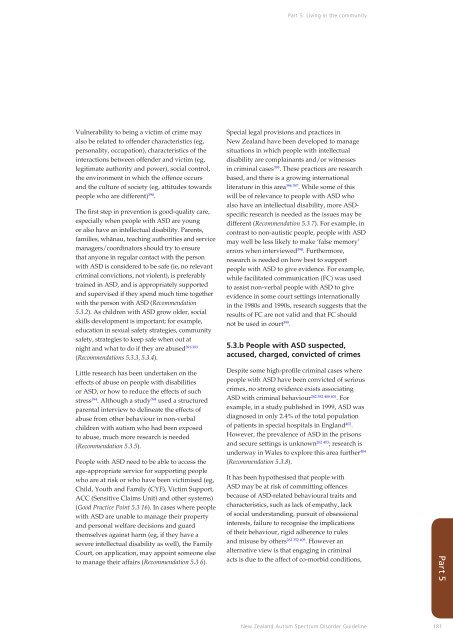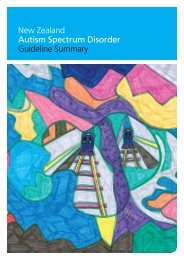New Zealand Autism Spectrum Disorder Guideline - Ministry of Health
New Zealand Autism Spectrum Disorder Guideline - Ministry of Health
New Zealand Autism Spectrum Disorder Guideline - Ministry of Health
You also want an ePaper? Increase the reach of your titles
YUMPU automatically turns print PDFs into web optimized ePapers that Google loves.
Part 5: Living in the community<br />
Vulnerability to being a victim <strong>of</strong> crime may<br />
also be related to <strong>of</strong>fender characteristics (eg,<br />
personality, occupation), characteristics <strong>of</strong> the<br />
interactions between <strong>of</strong>fender and victim (eg,<br />
legitimate authority and power), social control,<br />
the environment in which the <strong>of</strong>fence occurs<br />
and the culture <strong>of</strong> society (eg, attitudes towards<br />
people who are different) 390 .<br />
The first step in prevention is good-quality care,<br />
especially when people with ASD are young<br />
or also have an intellectual disability. Parents,<br />
families, whänau, teaching authorities and service<br />
managers/coordinators should try to ensure<br />
that anyone in regular contact with the person<br />
with ASD is considered to be safe (ie, no relevant<br />
criminal convictions, not violent), is preferably<br />
trained in ASD, and is appropriately supported<br />
and supervised if they spend much time together<br />
with the person with ASD (Recommendation<br />
5.3.2). As children with ASD grow older, social<br />
skills development is important; for example,<br />
education in sexual safety strategies, community<br />
safety, strategies to keep safe when out at<br />
night and what to do if they are abused 391-393<br />
(Recommendations 5.3.3, 5.3.4).<br />
Special legal provisions and practices in<br />
<strong>New</strong> <strong>Zealand</strong> have been developed to manage<br />
situations in which people with intellectual<br />
disability are complainants and/or witnesses<br />
in criminal cases 395 . These practices are research<br />
based, and there is a growing international<br />
literature in this area 396 397 . While some <strong>of</strong> this<br />
will be <strong>of</strong> relevance to people with ASD who<br />
also have an intellectual disability, more ASDspecific<br />
research is needed as the issues may be<br />
different (Recommendation 5.3 7). For example, in<br />
contrast to non-autistic people, people with ASD<br />
may well be less likely to make ‘false memory’<br />
errors when interviewed 398 . Furthermore,<br />
research is needed on how best to support<br />
people with ASD to give evidence. For example,<br />
while facilitated communication (FC) was used<br />
to assist non-verbal people with ASD to give<br />
evidence in some court settings internationally<br />
in the 1980s and 1990s, research suggests that the<br />
results <strong>of</strong> FC are not valid and that FC should<br />
not be used in court 399 .<br />
5.3.b People with ASD suspected,<br />
accused, charged, convicted <strong>of</strong> crimes<br />
Little research has been undertaken on the<br />
effects <strong>of</strong> abuse on people with disabilities<br />
or ASD, or how to reduce the effects <strong>of</strong> such<br />
stress 394 . Although a study 394 used a structured<br />
parental interview to delineate the effects <strong>of</strong><br />
abuse from other behaviour in non-verbal<br />
children with autism who had been exposed<br />
to abuse, much more research is needed<br />
(Recommendation 5.3.5).<br />
People with ASD need to be able to access the<br />
age-appropriate service for supporting people<br />
who are at risk or who have been victimised (eg,<br />
Child, Youth and Family (CYF), Victim Support,<br />
ACC (Sensitive Claims Unit) and other systems)<br />
(Good Practice Point 5.3 16). In cases where people<br />
with ASD are unable to manage their property<br />
and personal welfare decisions and guard<br />
themselves against harm (eg, if they have a<br />
severe intellectual disability as well), the Family<br />
Court, on application, may appoint someone else<br />
to manage their affairs (Recommendation 5.3 6).<br />
Despite some high-pr<strong>of</strong>ile criminal cases where<br />
people with ASD have been convicted <strong>of</strong> serious<br />
crimes, no strong evidence exists associating<br />
ASD with criminal behaviour 262 352 400 401 . For<br />
example, in a study published in 1999, ASD was<br />
diagnosed in only 2.4% <strong>of</strong> the total population<br />
<strong>of</strong> patients in special hospitals in England 402 .<br />
However, the prevalence <strong>of</strong> ASD in the prisons<br />
and secure settings is unknown 262 403 ; research is<br />
underway in Wales to explore this area further 404<br />
(Recommendation 5.3.8).<br />
It has been hypothesised that people with<br />
ASD may be at risk <strong>of</strong> committing <strong>of</strong>fences<br />
because <strong>of</strong> ASD-related behavioural traits and<br />
characteristics, such as lack <strong>of</strong> empathy, lack<br />
<strong>of</strong> social understanding, pursuit <strong>of</strong> obsessional<br />
interests, failure to recognise the implications<br />
<strong>of</strong> their behaviour, rigid adherence to rules<br />
and misuse by others 262 352 405 . However an<br />
alternative view is that engaging in criminal<br />
acts is due to the affect <strong>of</strong> co-morbid conditions,<br />
Part 5<br />
<strong>New</strong> <strong>Zealand</strong> <strong>Autism</strong> <strong>Spectrum</strong> <strong>Disorder</strong> <strong>Guideline</strong> 181











